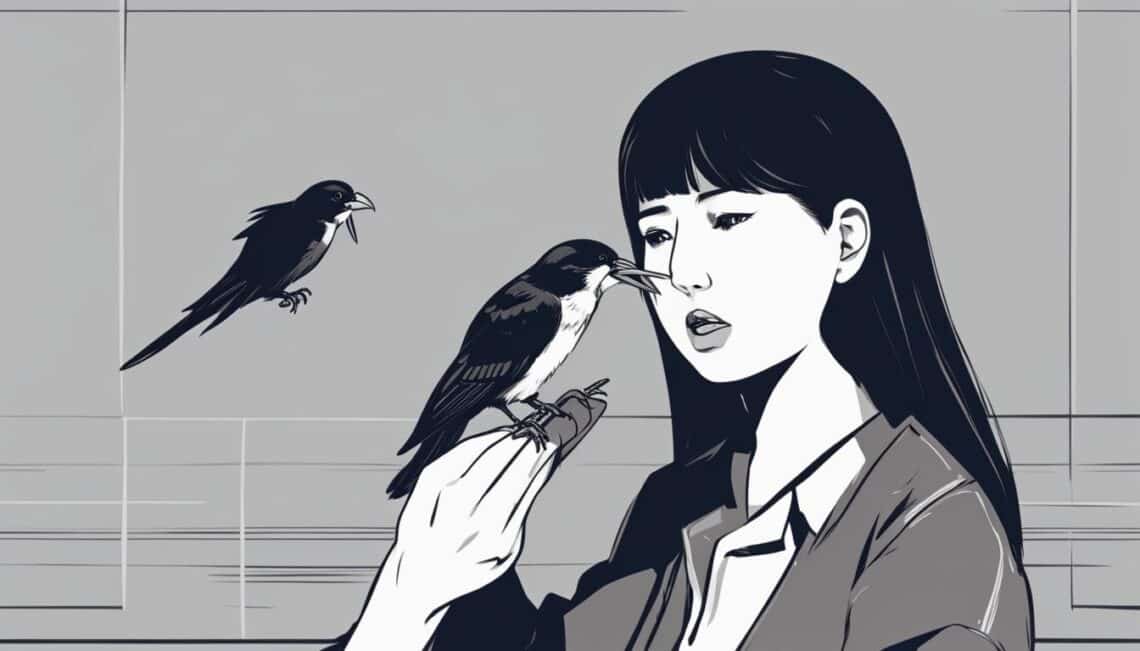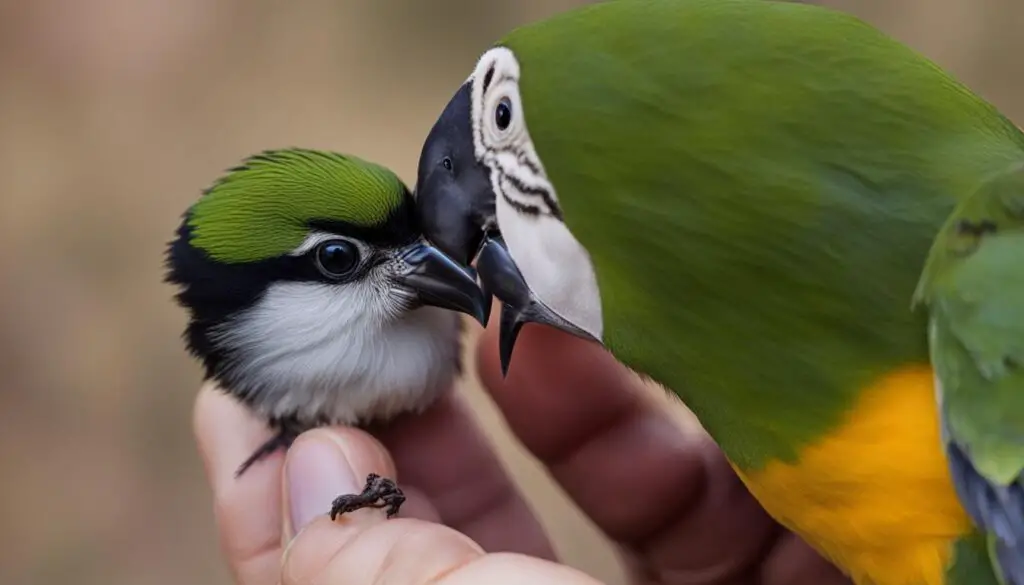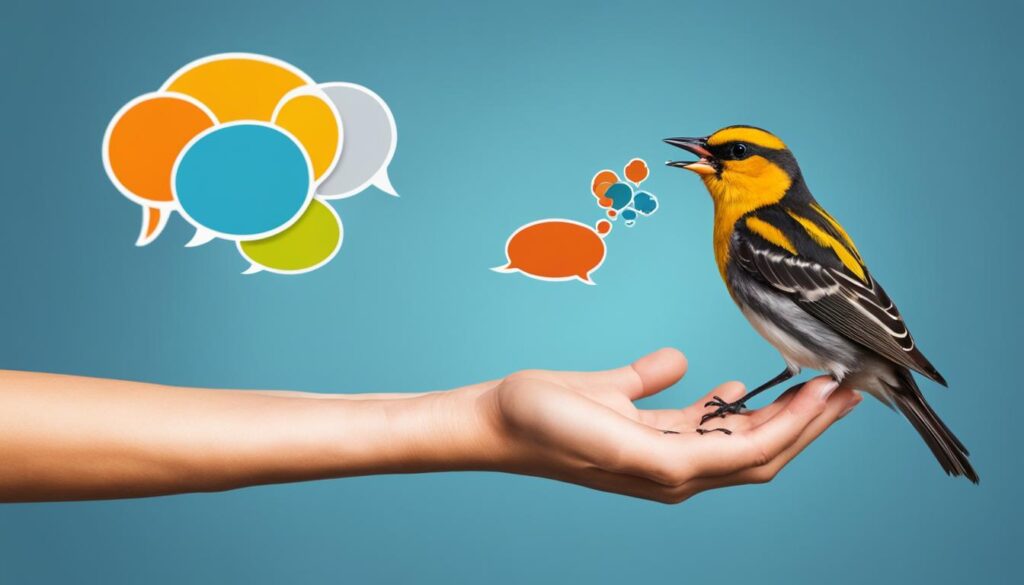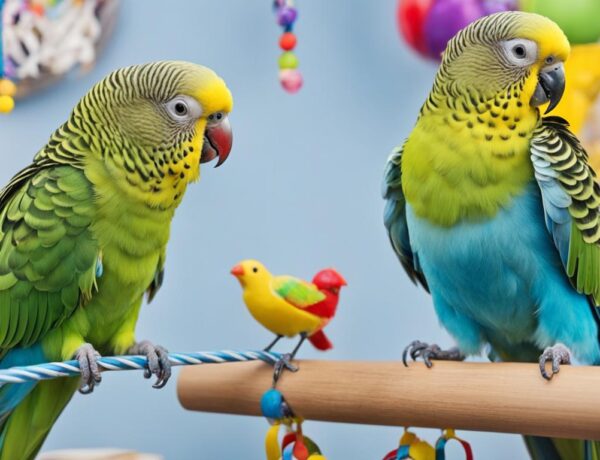Birds, such as parrots, are fascinating creatures that bring joy and companionship to many bird enthusiasts. However, dealing with biting issues can be a common challenge when it comes to small birds. Understanding the reasons behind their biting behavior and learning effective handling techniques can help create a harmonious relationship with your feathered friend.
Key Takeaways:
- Birds do not bite naturally and it is a learned behavior.
- Present your hand confidently when asking the bird to step up.
- Understand their body language and give them breaks when they show signs of not wanting to be handled.
- Never pull away when they bite and avoid reinforcement of the behavior by yelling or giving attention.
- Offer safe items for them to bite and chew on to redirect their behavior.
Understanding Why Birds Bite
Birds may bite for various reasons, including fear, protecting their territory, breeding behavior, frustration, sickness, or to communicate a message. It is important to understand the underlying cause of biting to effectively address the issue.
Biting in birds can be a form of communication, and it is crucial not to react with negative reinforcement such as yelling or punishing them. Instead, it is essential to identify the specific triggers for biting and address them accordingly. By understanding the reasons behind their biting behavior, we can create a safer and more harmonious interaction with our feathered friends.
“Biting more often than not has much more to do with what is happening in a bird’s surroundings than with its intrinsic nature.” – Veterinary Behaviorist Dr. Lore Haug
Common Triggers for Bird Biting
Let’s explore some common triggers that may cause birds to bite:
- Fear: Birds may bite when they feel threatened or scared. This can happen when they encounter unfamiliar people, animals, or objects in their environment. Understanding their fear triggers can help prevent biting episodes.
- Protecting territory: Birds can become territorial and aggressive when they feel their space is being invaded. Approaching their cage or nesting area without caution may result in defensive biting.
- Breeding behavior: During breeding season, some birds may display aggressive behavior, including biting, to protect their mates or territory. This behavior is temporary and can be managed with proper handling techniques.
- Frustration: Birds may bite when they are unable to communicate their needs or desires effectively. Frustration can arise from lack of mental stimulation, social interaction, or environmental enrichment.
- Sickness: When birds are in pain or unwell, they may resort to biting as a way to communicate their discomfort. It is important to monitor their health and seek veterinary care if necessary.
- Communication: Biting can also be a way for birds to convey messages such as asserting dominance, expressing displeasure, or establishing boundaries. Understanding their body language and vocalizations can help interpret their intentions.
“Birds are not necessarily born biters. Rather, they learn biting behaviors due to various factors and triggers in their environment.” – Avian Specialist Dr. Jane Goodfeather
By understanding the reasons behind bird biting behavior, we can work towards addressing these triggers and fostering a healthier relationship with our avian companions.
Tips for Preventing Bird Bites
When it comes to preventing bird bites, there are several strategies that can be effective. By understanding their body language and utilizing distraction techniques, you can help redirect their attention and discourage biting behavior. Here are some tips to help you avoid bird biting and handle your feathered friend with confidence:
- Be confident and firm: Birds can sense fear or uncertainty, so it’s important to present your hand confidently when asking them to step up. Stand tall, hold your hand steady, and use consistent commands.
- Understand their body language: Birds communicate through body language, and recognizing their cues can help you anticipate when they may not want to be handled. Signs such as fluffed feathers, wide eyes, or tense body posture indicate discomfort.
- Give them breaks: Just like humans, birds need breaks too. If your bird shows signs of not wanting to be handled or starts to exhibit aggressive behaviors, such as biting or snapping, it’s important to give them space and try again at a later time.
- Redirect their attention: If you notice your bird becoming agitated or showing signs of wanting to bite, try redirecting their attention. Gently jiggle your hand or offer a favorite treat as a distraction technique.
- Stick training: Stick training can be an effective method to prevent bites. By using a stick or perch, you can give the bird a target to step onto instead of using your hand directly.
Remember, it’s crucial to avoid negative reinforcement such as yelling, hitting, or punishing the bird. These actions can worsen the behavior and damage the trust between you and your feathered companion. Instead, focus on positive reinforcement and creating a safe and positive environment for your bird.
Expert Tip:
“Birds are highly intelligent creatures and respond well to positive reinforcement training. By using rewards, praise, and consistency in your training sessions, you can effectively prevent bird bites and build a strong bond with your feathery friend.” – Dr. Emily Parker, Avian Behavior Specialist
By implementing these tips and techniques, you can reduce the chances of bird bites and create a harmonious relationship with your feathered companion.
Continue reading to learn more about how to effectively deal with biting issues in birds.
Dealing with Biting in Birds
If a bird bites, it is important to remain calm and composed, avoiding any reaction that can reinforce the behavior. Reacting with yelling or punishment can escalate the issue rather than resolve it. Instead, gently put the bird down, giving them a time-out to calm down. Once they have settled, try picking them up again using a confident and firm approach.
Understanding the root cause of the biting is essential in addressing the issue effectively. Biting can be triggered by various factors such as fear, hormones, or pain. By identifying the underlying cause, you can take appropriate steps to mitigate the biting behavior. If the bird is biting out of fear, providing a safe and secure environment can help alleviate their anxiety.
Training birds with positive reinforcement techniques, such as clicker training, can aid in redirecting their biting behavior. By rewarding desired actions and behaviors, you can encourage the bird to engage in more desirable activities rather than resorting to biting.
| Bird Biting Solutions | Handling Aggressive Birds | Bird Training |
|---|---|---|
| Remain calm and composed | Identify the root cause of aggression | Use positive reinforcement training |
| Give the bird a time-out | Create a safe and secure environment | Set a routine for consistent handling |
| Understand the underlying cause of biting | Establish trust through positive interactions | Redirect biting behavior through training |
Establishing a routine and using consistent handling techniques is crucial in creating a safe and trusting environment for the bird. Regular training sessions and positive interactions will help the bird develop trust and confidence in their human companion, reducing the likelihood of biting incidents.
Common Misconceptions About Bird Biting
There are several misconceptions surrounding bird biting that can lead to misunderstandings and ineffective handling techniques. It is important to debunk these myths to provide a better understanding of bird behavior and promote a harmonious relationship between humans and birds.
Myth 1: Birds are inherently aggressive or mean
False. Birds do not bite out of malice or an innate aggressive nature. Biting is usually a form of communication or self-defense. Understanding the reasons behind their biting behavior is crucial in addressing the issue effectively.
Myth 2: Birds bite because they enjoy causing pain
False. Birds do not bite to inflict pain or harm intentionally. Biting can occur when a bird feels threatened, scared, or frustrated. It is crucial to recognize their body language and respond appropriately to avoid reinforcing the biting behavior.
Myth 3: All birds have the same body language
False. Each bird species may have unique body language cues. It is essential to familiarize yourself with the specific body language signals of your bird to better understand their emotions and intentions.
Myth 4: Punishing a biting bird will stop the behavior
False. Punishment, such as yelling or hitting, will not resolve the biting issue and may worsen the bird’s behavior. Birds are more responsive to positive reinforcement and establishing trust through consistent training methods.
“Understanding the misconceptions surrounding bird biting behavior helps us approach the issue with patience, empathy, and effective communication.” – Avian Behavior Specialist
By debunking these myths and gaining a deeper understanding of bird behavior, we can create a safe and nurturing environment for our feathered friends. Recognizing their body language, being attentive to their needs, and avoiding negative reinforcement are key components in preventing and addressing bird biting issues.’
| Common Misconceptions About Bird Biting | Facts |
|---|---|
| Birds are inherently aggressive or mean | Birds bite as a form of communication or self-defense |
| Birds bite because they enjoy causing pain | Biting occurs when a bird feels threatened, scared, or frustrated |
| All birds have the same body language | Each bird species may have unique body language cues |
| Punishing a biting bird will stop the behavior | Punishment can worsen the bird’s behavior, positive reinforcement is more effective |
Recognizing Warning Signs and Body Language
Recognizing the warning signs and body language of birds is crucial in preventing bites. When it comes to bird body language, there are specific signs that indicate aggression or discomfort. Understanding these signals can help you anticipate and avoid situations that may trigger biting.
Birds may display signs of aggression through behaviors such as:
- Eye pinning
- Feather ruffling
- Lunging
- Hissing
- Head-bobbing
These behaviors are a clear indication that the bird is feeling threatened or uncomfortable. By paying attention to these signals, you can take appropriate measures to prevent biting.
If a bird shows signs of not wanting to be handled, such as avoiding eye contact, moving away, or vocalizing in distress, it is important to respect their boundaries and give them a break. Forcing them into uncomfortable situations can escalate their fear or aggression, increasing the likelihood of biting.
Establishing trust with your bird is key to preventing bites. Take the time to bond with your bird, offering treats, positive reinforcement, and gentle interactions. Let the bird approach you on their terms, building a foundation of trust and comfort.
Recognizing Fear in Birds
Fear is a common emotion in birds and can often lead to aggressive behavior. Recognizing signs of fear in birds is crucial in understanding their needs and preventing bites. Some common signs of fear include:
- Wide eyes
- Flattened feathers
- Backing away or crouching
- Trembling
- Attempting to escape
If you notice these signs, it is important to create a calm and reassuring environment for your bird. Avoid sudden movements or loud noises that can further agitate them. Instead, give them space and time to calm down.
By recognizing the warning signs of aggression and fear in birds, you can take proactive steps to prevent bites and create a peaceful environment for both you and your feathered friend.
Conclusion
Handling bird biting issues in small birds requires a comprehensive approach that addresses the underlying causes, adopts effective handling techniques, and fosters a safe and trusting environment. By understanding the reasons behind biting behavior and being attentive to their body language, bird owners can take proactive steps towards minimizing and redirecting biting tendencies.
Negative reinforcement, such as yelling or punishment, should be avoided as it can exacerbate the problem. Instead, a focus on positive reinforcement training methods, like clicker training, can play a pivotal role in modifying their behavior. By rewarding desired actions and redirecting their attention towards appropriate stimuli, birds can learn to associate positive experiences with non-biting behaviors.
Consistency is key when handling biting issues in small birds. Establishing a routine for interaction and setting clear boundaries will help them feel secure and understand what is expected of them. Moreover, providing safe items for them to bite and chew on can help redirect their natural inclination to explore their beaks. By creating a harmonious environment that meets their physical and psychological needs, bird owners can foster a stronger bond with their feathered companions.
In summary, resolving biting issues in small birds requires patience, understanding, and proactive measures to address the root causes. By applying effective handling techniques, utilizing positive reinforcement, and creating a nurturing atmosphere, bird owners can navigate these challenges and develop a fulfilling relationship with their avian friends.
FAQ
How can I prevent my small bird from biting?
To prevent biting, it is important to present your hand confidently when asking the bird to step up and use consistent commands. Understand their body language and give them breaks when they show signs of not wanting to be handled. Avoid pulling away when they bite and refrain from yelling or giving attention. Offering safe items for them to bite and chew on can help redirect their behavior.
Why do birds bite?
Birds may bite for several reasons, including fear, protecting their territory, breeding behavior, frustration, sickness, or to communicate a message. Biting can be a form of communication, so it’s important to understand the underlying cause and not react with negative reinforcement. Identifying the specific triggers for biting and addressing them accordingly is crucial.
What strategies can I use to prevent bird bites?
Strategies for preventing bird bites include being confident and presenting your hand in a firm manner, understanding their body language, and giving them breaks when they show signs of not wanting to be handled. Distraction techniques, such as gently jiggling your hand or offering a favorite treat, can redirect their attention. Stick training can also be effective. Avoid yelling, hitting, or punishing the bird, as this can worsen the behavior.
What should I do if a bird bites?
If a bird bites, remain calm and avoid reacting with yelling or punishment, as this can reinforce the behavior. Gently put the bird down and give them a time-out, then try to pick them up again when they have calmed down. Understanding the cause of the biting, whether it’s fear, hormones, or pain, can help address the issue effectively. Positive reinforcement training, such as clicker training, can help redirect their biting behavior.
Are birds inherently aggressive or mean if they bite?
No, birds bite as a form of communication or self-defense. It’s important to understand their body language and recognize signs of fear, aggression, or discomfort. Avoid reinforcing the biting behavior by reacting with fear or punishment. Birds may bite out of fear or frustration, not because they are inherently aggressive.
How can I recognize warning signs and body language in birds?
Birds may show signs of aggression or discomfort through eye pinning, feather ruffling, lunging, hissing, or head-bobbing. Understanding these signals can help you anticipate and avoid situations that may trigger biting. If a bird shows signs of not wanting to be handled, give them a break and try again later. Establishing trust and avoiding forcing them into uncomfortable situations is important.
What should I do to deal with biting issues in small birds?
Dealing with biting issues in small birds requires understanding the underlying causes, practicing effective handling techniques, and creating a safe and trusting environment. Be confident, consistent, and attentive to their body language. Avoid negative reinforcement and focus on positive reinforcement training methods. Establish a routine and understand their needs to build a harmonious relationship with your small bird.







No Comments